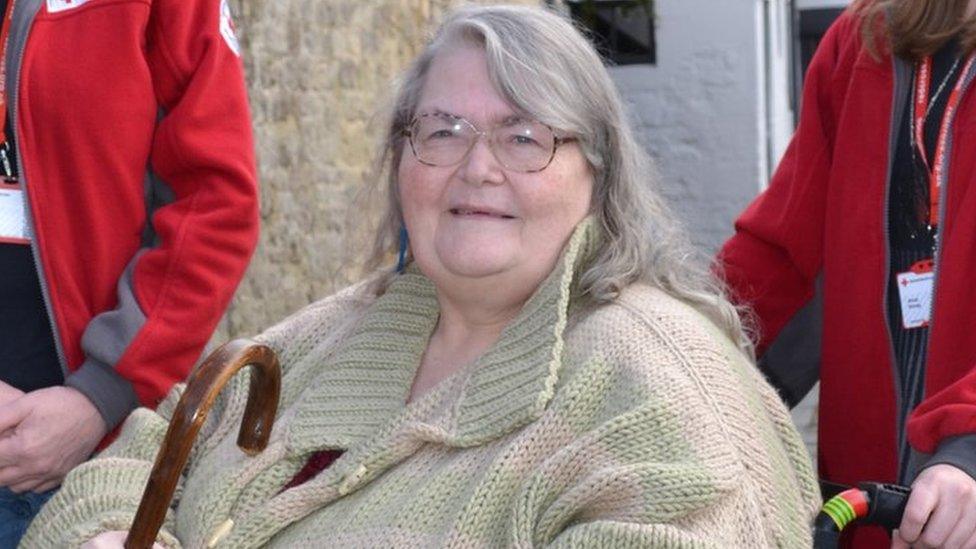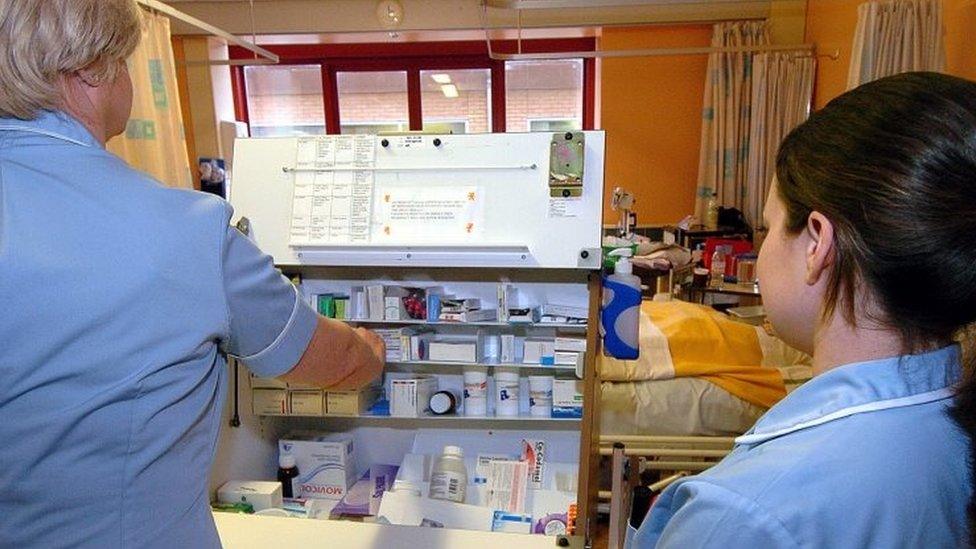Wheelchair shortage: 'I had to carry my son after he broke his leg'
- Published

Erin Gray had to carry her son Thomas out of hospital after he broke his leg
"It sounds dramatic but it was honestly the worst period of my life," says Erin Gray, recalling the months after her four-year-old son broke his leg.
Thomas Gray was one of the four million people annually in the UK who need access to a short-term mobility aid, according to a British Red Cross study, external.
Of that total, the study says more than three million people have to make do without.
A fall from a school climbing frame left Thomas with a fracture so bad doctors considered surgery to straighten his leg.
Yet later that day, after having his leg put in a cast, Ms Gray was forced to carry her son out of hospital.
She tells the BBC: "I remember carrying him down the corridor with this massive cast on - with all these bags because we'd been there all day - thinking: 'Is this normal?'
"I asked staff what we were supposed to do and they pretty much shrugged their shoulders.
"I know the NHS do the best they can but I did take for granted we'd be given some support or advice before leaving. There was nothing."
Of the 139 NHS wheelchair services surveyed by the charity, 114 said they were unable to provide wheelchairs for short-term use.
With no statutory duty on the NHS to provide them, most public services say they do not have the funding to meet people's needs.
And with a basic wheelchair costing roughly £150, many in need are having to go without.
'Imprisoned'
The Red Cross study found patients were spending more time occupying hospital beds because they are unable to leave.
Some of those that did make it home but still lacked mobility were then relying on "costly home visits", the study added.
In some cases, people's health was found to have deteriorated due to their lack of mobility.
Margaret Kear, 65, from Bath says she was "imprisoned" in her own home for years after a long-standing back injury eventually left her unable to stand.

Margaret Kear felt trapped indoors after an accident left her with severe back pain
The isolation after her husband's death led to depression and, in turn, hoarding tendencies, which increased her sense of loneliness and detachment.
"I didn't leave the house for over three years," she says. "If it hadn't been for my dog I wouldn't have had a reason to get out of bed."
The hoarding, which had begun after her initial injury, worsened when she "discovered shopping channels" during her time indoors.
Ms Kear said the shopping allowed her "to feel like I had done something" with her day.
Despite regular visits from doctors, Ms Kear says she was never offered a wheelchair or advice on how to get one.
It was only after charities entered her life that she was given regular access to one, which enabled her to leave the house in the company of a carer.
Ms Kear described the change in her mental health as "absolutely wonderful" after finally venturing back outdoors - but not everyone is as fortunate.
The Red Cross provides more than 60,000 short-term wheelchair loans to people in the UK each year, making it the nation's largest supplier.
But the charity's survey of more than 4,000 people found that while over 8% of the population would benefit from a mobility aid in an average year, only 1% are given access to one.
'I couldn't leave him'
A 34-year-old man with Down's syndrome living with his mother in a town in Scotland talked to us, but did not want to be identified.
Years of taking steroids to treat Keratoconus - a degenerative eye condition commonly observed in people with Down's - has weakened his bones by reducing their density.
In April, the man shattered his hip following a fall in his garden and was told by doctors he could not put any weight on his foot.
Rather than provide him with a wheelchair, though, he was given a walking frame.
"Initially I couldn't leave him," his mother says.
"If he fell it would be a disaster. For the first six weeks I was really confined to home."
She adds: "I just thought there'd be more support from the hospital - the occupational therapist said they'd be out within a week to assess the house, but it actually took three and a half months.
"We've had nothing from the hospital."
'No brainer'
Her son has still not healed and his mother says his recovery is "being prolonged as the hip gets moved".
Providing statutory provision of short-term wheelchairs "should be a no-brainer", said Mike Adamson, chief executive of the British Red Cross.
"They reduce recovery time, boost independence and would ultimately save money for both the NHS and social care," he added.
Responding to the call, an NHS England spokesman said local "GP-led health groups" were responsible for "securing and funding wheelchair services for patients".
The spokesman added that for people with long-term needs, the NHS has "introduced personal budgets to give them more choice on the best wheelchair for them".
- Published25 July 2018

- Published24 July 2018

- Published11 December 2017
